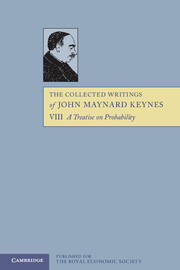Book contents
- Frontmatter
- Contents
- General Introduction
- Editorial Foreword by R. B. Braithwaite
- Editorial Note
- Preface to the First Edition
- I FUNDAMENTAL IDEAS
- 1 THE MEANING OF PROBABILITY
- 2 PROBABILITY IN RELATION TO THE THEORY OF KNOWLEDGE
- 3 THE MEASUREMENT OF PROBABILITIES
- 4 THE PRINCIPLE OF INDIFFERENCE
- 5 OTHER METHODS OF DETERMINING PROBABILITIES
- 6 THE WEIGHT OF ARGUMENTS
- 7 HISTORICAL RETROSPECT
- 8 THE FREQUENCY THEORY OF PROBABILITY
- 9 THE CONSTRUCTIVE THEORY OF PART I SUMMARISED
- II FUNDAMENTAL THEOREMS
- III INDUCTION AND ANALOGY
- IV SOME PHILOSOPHICAL APPLICATIONS OF PROBABILITY
- V THE FOUNDATIONS OF STATISTICAL INFERENCE
- Bibliography
- Index
7 - HISTORICAL RETROSPECT
from I - FUNDAMENTAL IDEAS
Published online by Cambridge University Press: 05 November 2012
- Frontmatter
- Contents
- General Introduction
- Editorial Foreword by R. B. Braithwaite
- Editorial Note
- Preface to the First Edition
- I FUNDAMENTAL IDEAS
- 1 THE MEANING OF PROBABILITY
- 2 PROBABILITY IN RELATION TO THE THEORY OF KNOWLEDGE
- 3 THE MEASUREMENT OF PROBABILITIES
- 4 THE PRINCIPLE OF INDIFFERENCE
- 5 OTHER METHODS OF DETERMINING PROBABILITIES
- 6 THE WEIGHT OF ARGUMENTS
- 7 HISTORICAL RETROSPECT
- 8 THE FREQUENCY THEORY OF PROBABILITY
- 9 THE CONSTRUCTIVE THEORY OF PART I SUMMARISED
- II FUNDAMENTAL THEOREMS
- III INDUCTION AND ANALOGY
- IV SOME PHILOSOPHICAL APPLICATIONS OF PROBABILITY
- V THE FOUNDATIONS OF STATISTICAL INFERENCE
- Bibliography
- Index
Summary
1. The characteristic features of our philosophy of probability must be determined by the solutions which we offer to the problems attacked in chapters 3 and 4. Whilst a great part of the logical calculus, which will be developed in Part II, would be applicable with slight modification to several distinct theories of the subject, the ultimate problems of establishing the premisses of the calculus bring into the light every fundamental difference of opinion.
These problems are often, for this reason perhaps, left on one side by writers whose interest chiefly lies in the more formal parts of the subject. But probability is not yet on so sound a basis that the formal or mathematical side of it can be safely developed in isolation, and some attempts have naturally been made to solve the problem which Bishop Butler sets to the logician in the concluding words of the brief discussion on probability with which he prefaces the Analogy.
In this chapter, therefore, we will review in their historical order the answers of philosophy to the questions, how we know relations of probability, what ground we have for our judgments, and by what method we can advance our knowledge.
2. The natural man is disposed to the opinion that probability is essentially connected with the inductions of experience and, if he is a little more sophisticated, with the laws of causation and of the uniformity of nature. As Aristotle says, ‘the probable is that which usually happens’.
- Type
- Chapter
- Information
- The Collected Writings of John Maynard Keynes , pp. 86 - 99Publisher: Royal Economic SocietyPrint publication year: 1978



